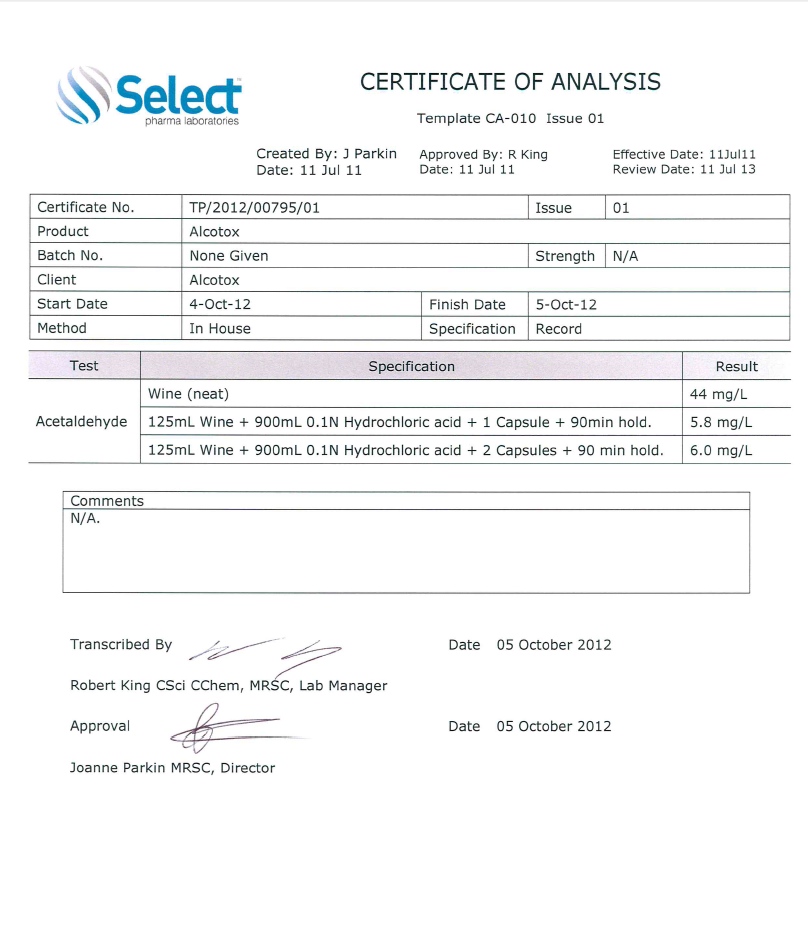
About Acetaldehyde
Acetaldehyde is the toxic by-product of alcohol metabolism. It is used in industry in the manufacture of plastics, adhesives and fabrics. It is chemically similar to formaldehyde which is used in insulating foams,plywood, particle board and embalming fluid. Acetaldehyde is 30 times more toxic than alcohol itself and is a known carcinogen.
Although acetaldehyde is short lived, usually existing in the body before it is further broken down into acetate, it has the potential to cause significant damage. This is particularly evident in the liver, where the bulk of alcohol metabolism takes place.
Some alcohol metabolism also occurs in other tissues, including the pancreas and the brain, causing damage to cells and tissues. Additionally, small amounts of alcohol are metabolized to acetaldehyde in the gastrointestinal tract, exposing these tissues to acetaldehyde’s damaging effects.
Acetaldehyde and Cancer
Acetaldehyde is the chemical that causes hangovers, but it can also cause cancer by damaging DNA and preventing it from being repaired. People who smoke and drink heavily have very high levels of acetaldehyde in their saliva. “You cannot get a cancer cell occurring unless DNA is altered. When you drink, the acetaldehyde is corrupting the DNA of life and puts you on the road to cancer” – Dr KJ Patel, Medical Research Council’s laboratory of molecular biology, Cambridge.
Acetaldehyde and alcoholism:
A high acetaldehyde level impairs its own metabolism, more of which therefore accumulates, and causes further liver damage–hepatitis and cirrhosis.Recent investigations have suggested that acetaldehyde may be responsible for the development of alcohol addiction. Acetaldehyde in the brain may inhibit enzymes designed to convert certain nerve transmitters from aldehydes to acids. The nerve transmitters that accumulate may then react with the acetaldehyde to form compounds that are startlingly similar to morphine.
Alcotox Acetaldehyde Study
Select Pharma laboratories conducted the following study to investigate the effects of Alcotox on reducing the acetaldehyde levels of common alcoholic beverages. The dosage used was standard 975 mg Alcotox ( 1 size 00 capsule ) and 1 standard drink equivalent of the alcoholic beverage under test.
Study Date :
5 October 2012
Study Objectives:
To investigate the effects of Alcotox on reducing acetaldehyde levels in wine.
Method:
125 ml of white wine at 12.5% alcohol concentration was used in the test. The measured baseline acetaldehyde level was 44 mg/litre. To simulate stomach acid conditions, the white wine was mixed with hydrochloric acid solution and incubated for 90 minutes at 37 degrees Celsius. Single and double dose of 975 mg of Alcotox was administered and subsequent acetaldehyde levels were measured. Each test was run in duplicate.
Results:
A single dose of 975 mg Alcotox reduced acetaldehyde present in the white wine by 86.8%, from baseline 44 mg/l to 5.8 mg/l.
Conclusions:
The results are overwhelmingly conclusive and demonstrate the powerful ability of Alcotox to target, scavenge and neutralise acetaldehyde. The results justify further research into the Alcotox effect.


